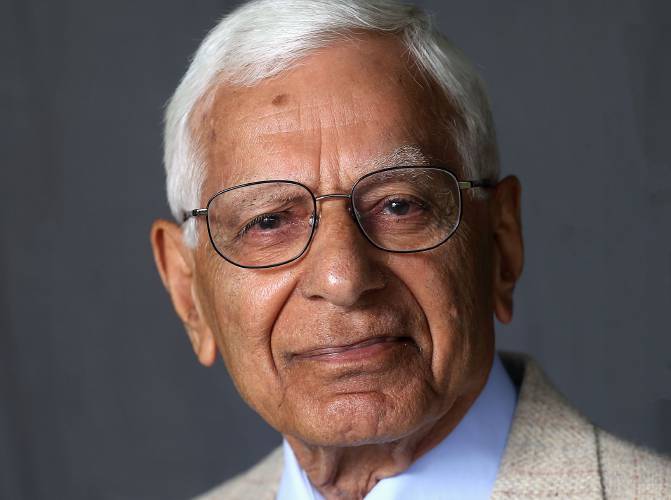Column: Contrarian expectations create moral dilemma on university campuses

Narain Batra. Copyright (c) Valley News. May not be reprinted or used online without permission. Send requests to permission@vnews.com. Geoff Hansen
| Published: 10-30-2023 10:22 AM |
The whole world watched the naked face of terror incarnate on the early morning of Oct. 7. Hamas launched a most barbaric and horrendous attack on Israel, with thousands of rockets and hundreds of gunmen across the border from the Gaza Strip. The assault targeted civilians in towns and villages, kibbutzim, and at a music festival. The attack killed more than 1,400 people, including Israeli civilians and soldiers, and many foreigners. Hamas also took more than 200 hostages including children.
The brazen attack sparked a fierce response from Israel, which launched airstrikes and ground operations to stop the invasion and rescue the hostages. But bombing densely populated areas like Gaza has resulted in not only significant civilian casualties and human rights violations but also anger, resentment, and a desire for revenge among the affected populations and their sympathizers in the Arab-Muslim world.
A stray rocket blast tore through a hospital in Gaza City killing hundreds of Palestinians. Although expert forensic analysis showed that an Islamic Jihad rocket meant for Israel went astray and killed innocent civilians, in the fog of war anything can happen. Far away from the zone of conflict, a 6-year-old Palestinian-American boy was senselessly killed in his home in Illinois by the landlord.
The total annihilation of Hamas without killing innocent Gaza Palestinian civilian population seems beyond comprehension, despite President Joe Biden’s dual strategy of military support for Israel and humanitarian aid for Gaza Palestinians.
With hundreds of thousands of foreign students in the United States, the Gaza-Israel war has created a moral dilemma on university campuses. As the events have unfolded, lines between good and evil, right and wrong, have become increasingly blurred. Universities are traditionally places where freedom of speech is highly valued. However, the conflict has led to heated debates, protests, and sometimes even hate speech. Administrators and students are torn between allowing open dialogue and preventing the spread of hate and misinformation.
The conflict has sparked student activism and protests on campuses, with students expressing their support for either side or advocating for peace and dialogue. Students with personal connections to the conflict, such as those from Gaza or Israel, have experienced emotional distress and anxiety. Campuses would need to provide support services and resources to help students cope with these feelings. In some cases, tensions related to the conflict could lead to concerns about physical safety. Universities may need to enhance security measures and ensure the safety of students, faculty, and staff. Universities may need to foster dialogue and create safe spaces for constructive conversations to promote understanding and empathy, though it may not be always possible.
But passions are running high. For example, Zareena Grewal, a Yale professor, tweeted and condemned Israel as a “murderous, genocidal settler state.” Russell Rickford, a Cornell professor said that he was energized and exhilarated by the Hamas attack, though subsequently he regretted the remarks and apologized for his inexcusable utterance.
School administrators have unequivocally condemned such reprehensible opinions, while defending free speech on the campus. Cornell President Martha Pollack said that Rickford’s comments “speak in direct opposition to all we stand for at Cornell.”
Article continues after...
Yesterday's Most Read Articles
 Homeless Upper Valley couple faces ‘a very tough situation’
Homeless Upper Valley couple faces ‘a very tough situation’
 Crane crash on Interstate 89
Crane crash on Interstate 89
 Kenyon: Constitutional rights should trump Dartmouth’s private interests
Kenyon: Constitutional rights should trump Dartmouth’s private interests
 West Lebanon crash
West Lebanon crash
 Editorial: Response to campus protests only adds fuel to the fire
Editorial: Response to campus protests only adds fuel to the fire
Administrators and educators face the challenge of fostering an environment where all must be heard and respected. There is a fine line between educating students about the conflict and propagating a particular viewpoint. Universities must ensure that they provide balanced, factual information without promoting a specific political agenda. In the present circumstances, it has been extremely challenging.
In some cases, the Gaza-Israel conflict has threatened donor funding to universities. Universities that receive direct funding from private foundations or individuals who have strong views on the conflict have seen this funding threatened. Some donors have chosen to withdraw their support because they disagreed with the university’s stance on the conflict. Alumni who have felt strongly about the conflict have threatened to withhold donations if the university would not adequately address the issue or is taking a stance they disagree with.
For example, Jon Huntsman Jr., former governor of Utah, U.S. Ambassador and a UPenn alumnus, decided to stop future donations from his family foundation to the University of Pennsylvania, protesting against the University’s slow response to antisemitism, stating that “The University’s silence in the face of reprehensible and historic Hamas evil against the people of Israel (when the only response should be outright condemnation) is a new low.”
Larry Summers, former Harvard University president and former Treasury Secretary has been extremely critical of the institution’s lack of strong response to the school’s students, Palestine Solidarity Groups, who blamed Israel for the Hamas terrorists attack. Harvard President Claudine Gay while condemning the “barbaric atrocities perpetrated by Hamas,” rejected any demand to punish the student groups. She vociferously affirmed the university’s commitment to free expression, adding: “That commitment extends even to views that many of us find objectionable, even outrageous. We do not punish or sanction people for expressing such views, but that is a far cry from endorsing them.”
Victoria’s Secret billionaire Leslie Wexner cut off the Wexner Foundation ties with Harvard University saying, “We are stunned and sickened by the dismal failure of Harvard’s leadership to take a clear and unequivocal stand against the barbaric murders of innocent Israeli civilians.”
However, it’s important to note that these instances may not be representative of all universities or donors, and many donors continue to support universities regardless of their stance on the conflict.
In these challenging times when university campuses cannot remain unaffected by raging geopolitical turmoil, it is imperative for university leaders to have the moral courage to see that the university’s academic mission, including unfettered and robust free speech, is not shortchanged by donors or political activists.
Narain Batra is affiliated with the Graduate College at Norwich University.

 Editorial: Hartford is right to give banners due consideration
Editorial: Hartford is right to give banners due consideration Editorial: Chris Sununu’s moral vacuum
Editorial: Chris Sununu’s moral vacuum Editorial: Gambling tarnishes America’s sporting life
Editorial: Gambling tarnishes America’s sporting life
